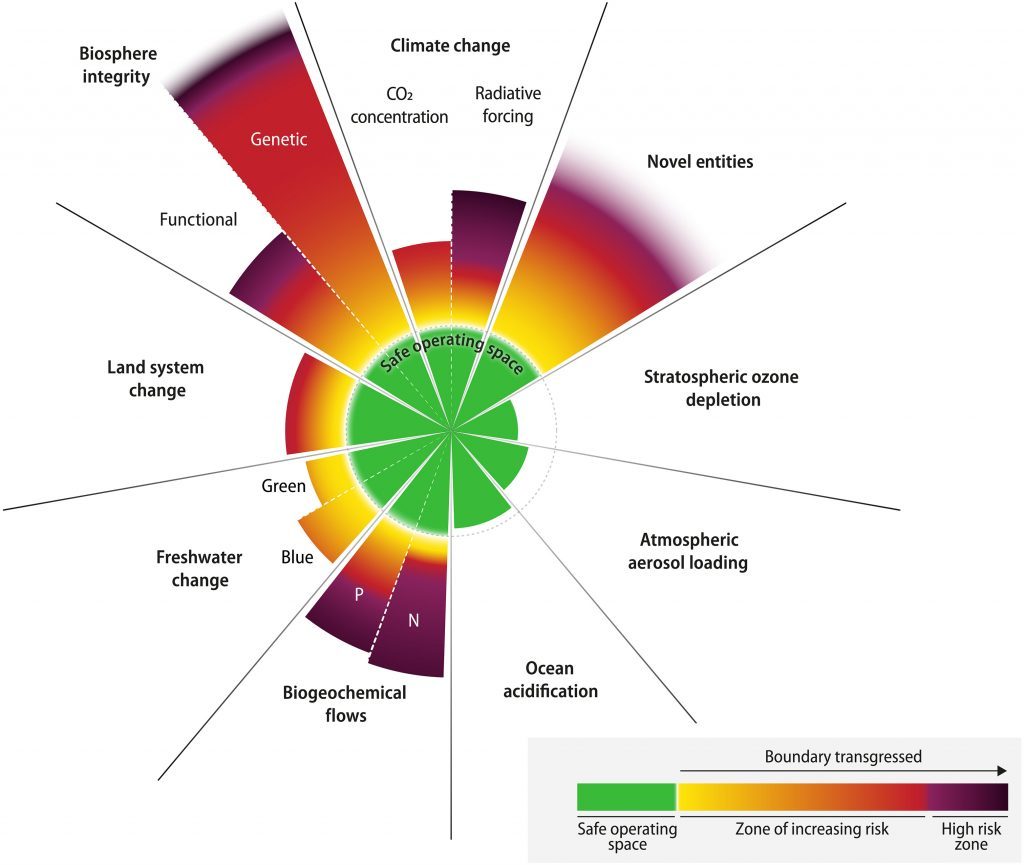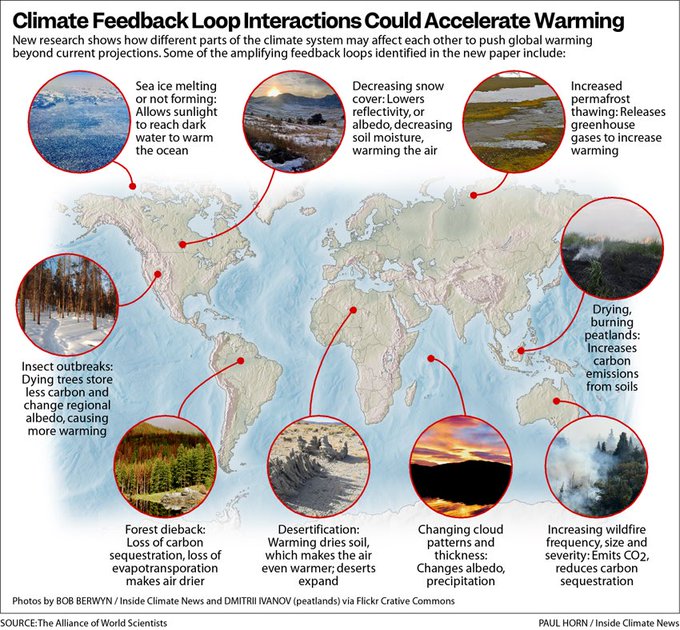Crossing the Rubicon? Planetary Boundaries & Tipping Points
Dec 12th, 2023 | By admin | Category: Climate ChangeBy Suzanne York.
The year 2023, not surprisingly, will end up being the warmest year in recorded history, according to the European Union’s Copernicus Climate Change Service (C3S). Many other organizations have said the same. Every month since June has been the hottest such month on record.
We’ve been warned, over and over and over and…
The past September, an analysis in the journal Science Advances found that Earth is “well outside the safe operating space for humanity”, having crossed six of what are considered the nine boundaries that essentially define Earth’s life support system, due to human activities.
Humans have blown past the six following limits: climate change, biosphere integrity (which includes biodiversity), freshwater availability, land use, nutrient pollution and novel entities (meaning human-made pollution, such as microplastics and radioactive waste). Only ocean acidification, air pollution and ozone depletion remain within the constraints.
“This does not mean that we are pushing the planet across an irreversible collapse,” said Johan Rockström, the director of the Potsdam Institute for Climate Impact Research and a co-author of the paper. “But it means we’re losing resilience — we are putting the stability of the Earth system at risk, and the buffering capacity of the Earth system to buffer stress and shocks at risk.”
In October, a report in Bioscience warned that 20 of the 35 planetary vital signs scientists use to track the climate crisis are at record extremes. As well as greenhouse gas emissions, global temperature and sea level rise, the indicators also include human and livestock population numbers.
Dr. Christopher Wolf, at Oregon State University (OSU) in the US and a lead author of the report, said: “Without actions that address the root problem of humanity taking more from Earth than it can safely give, we’re on our way to the potential collapse of natural and socioeconomic systems and a world with unbearable heat and shortages of food and freshwater.”
Now, once again, yet another warning has been given, on passing more tipping points. Scientists are calling out that Earth is poised to pass at least five crucial tipping points if no action is taken to get off the business as usual train.
These shifts include:
- The collapse of big ice sheets in Greenland;
- The collapses of ice sheets in the West Antarctic;
- the widespread thawing of permafrost;
- the death of coral reefs in warm waters;
- The collapse of one oceanic current in the North Atlantic.
See a pattern here? Collapse, collapse, collapse. This is happening on our watch, as climate negotiators, activists, scientists and others fight to phase out fossil fuels at the COP28 talks in Dubai. See “‘Verge of complete failure’: Climate summit draft drops the mention of fossil fuel phase-out, angering advocates.”
The researchers of this latest report said the systems were so tightly linked they could not rule out “tipping cascades”.
We don’t really know when or how fast things will fall apart. But efforts that we do now can have an effect and change course.
The issue is not that climate is changing – of course climate is changing, it always has. It’s the speed at which it is changing, which is unprecedented in millions of years.
Everywhere you look there are major signs of change to the planet, and it’s not good. Author Fatima Bhutto captured our situation, and fate, so well in an op-ed in the Washington Post aptly titled “Climate change is the catastrophe to end all other catastrophes”:
We live in an era of dreadful superlatives. July was the planet’s hottest month ever recorded. In China, people suffered an all-time-high temperature of 126 degrees Fahrenheit, and numerous other countries sweltered. Similar records were broken in August and September, suggesting that “hottest ever” is the new normal. Three months of extreme weather displaced 150,000 people and killed 18,000 globally. These ever-rising milestones, ever-deadlier temperatures, portend accelerating horrors for the billions of people who call this planet home. The same pound of flesh will be extracted from every nation, rich or poor, whether their leaders believe that things aren’t really so bad. We will endure these disasters — wildfires, super floods, hurricanes and tsunamis — for as long as possible. Not long at all, I’m afraid.
Yet we are moving painfully slowly at best, or at worse, in the wrong direction. Case in point – Exxon-Mobil recently doubled down on fossil fuel production with acquisition of another fossil fuel entity. What climate emergency?
And it is costing countries a lot of money – the U.S. National Climate Assessment found extreme weather events have resulted in a disaster every three weeks costing at least $1 billion. Maybe this will get some attention if a burning planet does not.
Sina Loriani, from the Potsdam Institute for Climate Impact Research, said tipping-point risks should be taken very seriously, and emphasized that “Crossing these thresholds may trigger fundamental and sometimes abrupt changes that could irreversibly determine the fate of essential parts of our Earth system for the coming hundreds or thousands of years.”
Sooner or later we will have to change. The longer we wait, the more difficult, and costly, it will be. The choices we make today will have serious ramifications decades from now. We have the solutions – supporting rights, especially for women and girls by investing in reproductive health, rethinking the economy and ideas around degrowth instead of rampant consumption, respecting that Nature has the right to thrive and flourish and is not there just for humanity to take from, to name a few.
Will our modern society cross the proverbial Rubicon and ignore the planetary tipping points or turn to solutions that empower people and help protect planet? The choice is obvious.
Suzanne York is Director of Transition Earth.



